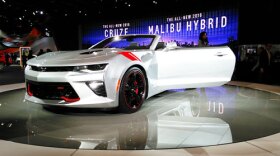Donald Trump's trade deal policies and his strong-arming of the U.S. auto industry could help to bring back auto factory jobs, says economist Sean McAlinden, formerly with the Center for Automotive Research and now an independent consultant.
Trump has threatened companies, in particular Ford and Toyota, with stiff tariffs for building cars in Mexico, although nearly all major car companies also build cars in Mexico.
He has also withdrawn the U.S. from the Trans Pacific Partnership trade agreement, and he plans to renegotiate NAFTA, the North American Free Trade Agreement.
McAlinden says that could result in up to 50,000 auto assembly and supplier jobs returning to the U.S.. That's because car companies are likely to respond to the new environment by nixing plans for new production capacity in Mexico, and when new capacity is needed, it will be built here instead.
It could potentially result in four to five new automotive plants setting up shop in the U.S., says McAlinden. ""If we got two more assembly plants back in Michigan, it's worth it."
He's referring to the flip side of the equation. Since labor is more expensive in the U.S., bringing production back will result in more expensive cars. He figures about $400 to $500 could be added to the cost of an average new vehicle.
But any new factories that are built in the U.S. will be highly automated, says McAlinden, and that will limit the numbers of new jobs that will be created. Still, many of the jobs will be high-paying, and some of the job creation will help the United Auto Workers gain members.
"The UAW should expect to get something out of this," says McAlinden. "Trump is saying words now that they've dreamt of Democratic presidents saying for years, and he's saying exactly what the UAW has begged for since NAFTA passed."




